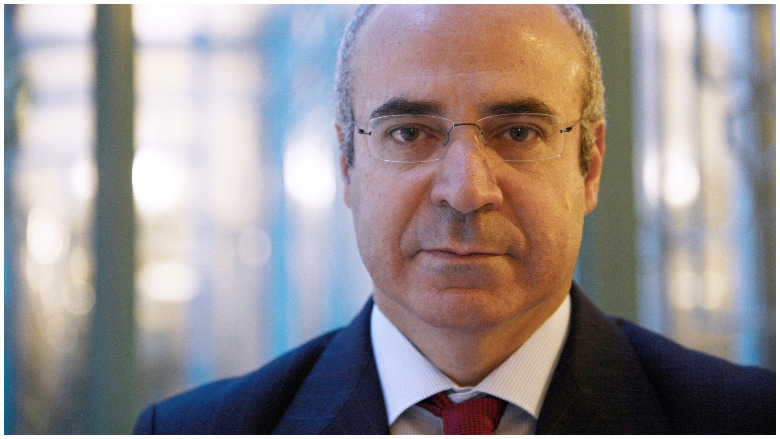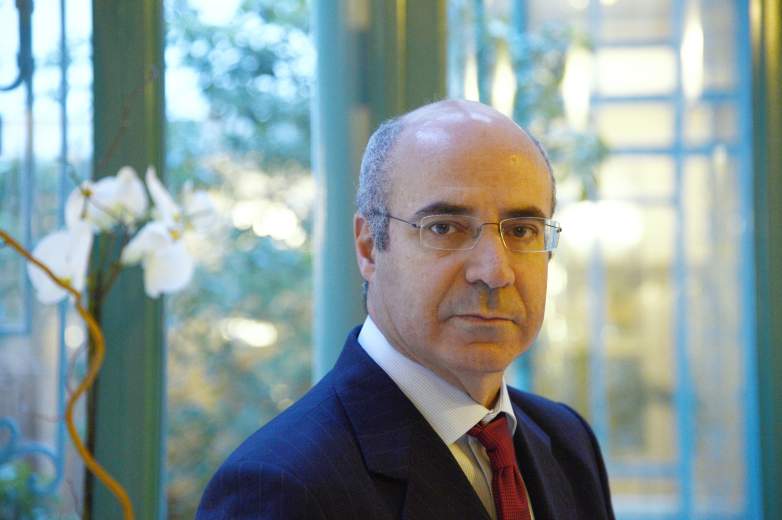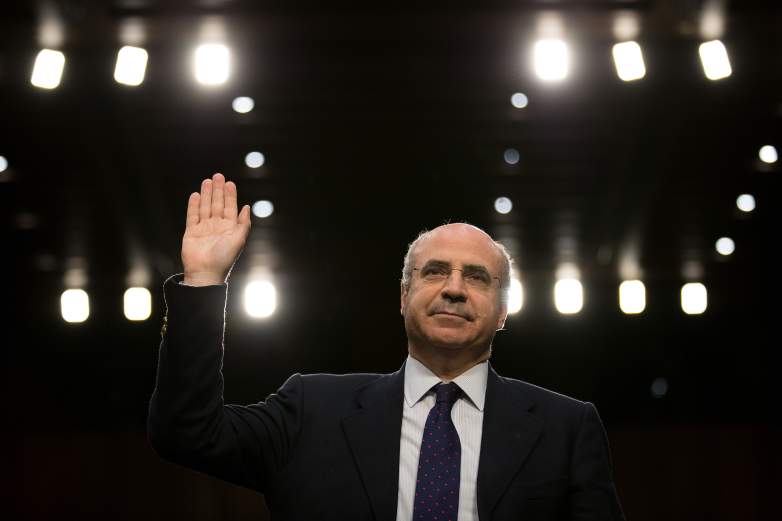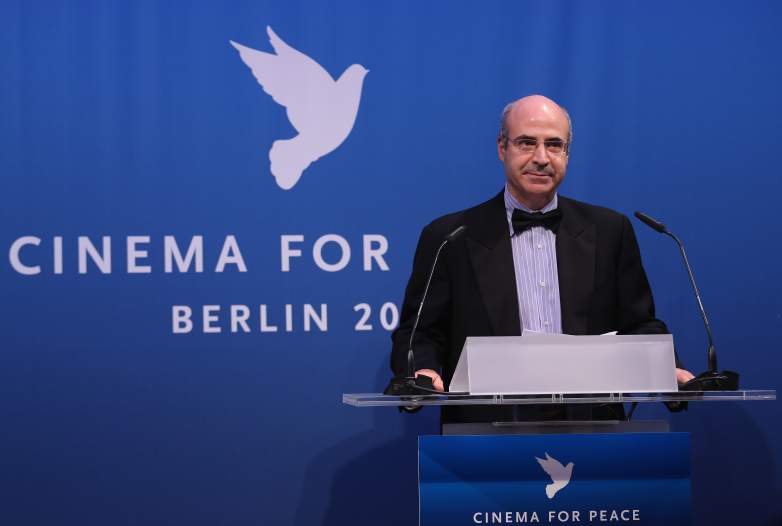
Getty William Browder
Bill Browder is an American-born businessman with family ties to the Communist Party who is the bane of Vladimir Putin for his efforts to seek global sanctions against Russians. Putin mentioned Bill Browder in his July 16, 2018 news conference with President Donald Trump.
William Browder – who has been instrumental in highlighting the death of a Russian whistleblower – has been called a “a banker turned human-rights activist.” Browder has accused Putin of murdering the whistleblower, Sergei Magnitsky, who was Browder’s attorney. At times, Browder, who made a fortune doing business in Russia, has come up in controversies involving Fusion GPS, the American firm that commissioned the Christopher Steele dossier against Trump with funding ultimately from, in part, the Hillary Clinton campaign.
What reportedly upsets Putin most is Browder’s lobbying efforts, which helped lead to a U.S. law called the Magnitsky Act. According to Human Rights Watch, the Magnitsky Act was passed in 2012 by the United States Congress and “imposed sanctions on a list of Russian officials believed to be responsible for serious human rights violations, freezing any US assets they hold and banning them from entry into the United States.”
The Geneva Summit for Human Rights and Democracy wrote that Browder, the CEO of Hermitage Capital Management, has “devoted his life to pursuing the Putin regime’s human rights abusers through sanctions legislation.”
“In Putin’s Russia, there are no good guys,” Browder said in a talk before that group. “Instead of arresting the people who stole the $230 million, the same people that Magnitsky testified against came to his house and arrested and tortured him.”
Here’s what you need to know:
1. Putin Claimed Browder’s Associates Gave $400 Million to Hillary Clinton’s Campaign
Asked about the 12 Russians indicted for allegedly hacking the Hillary Clinton campaign and Democratic National Committee, Putin said during his news conference with President Trump that United States’ law enforcement and Robert Mueller could have access to those men alongside Russia, pitching a sort of joint investigation, even though the indictment accuses the indicted men of being Russian military officers.
However, Putin demanded that the United States “reciprocate” and allow Russian law enforcement access to William Browder. Putin claimed that “business associates of Mr. Browder have earned over $1.5 billion in Russia. They never paid any taxes. Neither in Russia, nor in the United States. The money escaped the country. They were transferred to the United States. They sent a huge amount of money, $400 million as a contribution to the campaign of Hillary Clinton…. It might have been legal, the contribution itself, but the way the money was earned was illegal.”
He claimed intelligence officers guided those transactions. “So we have an interest in questioning them,” said Putin. “That can be a first step.”
According to Newsweek, Browder’s company was “once the largest foreign investor in Russia. But in 2006, the authorities kicked him out of the country, calling him a threat to national security.” Browder is a hedge fund manager. Newsweek reported that Browder claimed in an interview that Putin is so angry about the Magnitsky Act because he believes it could imperil his own personal wealth.
Trump has been criticized by Democrats and some Republicans for the press conference, in which he did not condemn Russia for the hacking allegations into Clinton’s campaign and the Democratic National Committee. The president and Putin denied Trump colluded with Russia, and Trump said of the hacking, “They said they think it’s Russia; I have President Putin, he just said it’s not Russia. I will say this: I don’t see any reason why it would be. I have great confidence in my intelligence people, but I will tell you that President Putin was extremely strong and powerful in his denial today.”
2. Browder Is the Grandson of the Former Head of the Communist Party in the United States
Although he made his fortune in business, Bill Browder, whose net worth is estimated in the several billion dollars, hails from a family with ties to the American Communist Party.
According to a 2009 article in Stanford Business, Browder is the grandson of Earl Browder, “a union organizer from Kansas who went to Moscow in 1927, married a Russian, and became the head of the Communist Party in the United States. The younger Browder grew up in Chicago, attended the University of Chicago, and later Stanford GSB.”
William Browder told the site: “How do you rebel against a family of Communists? I rebelled by putting on a suit and tie and becoming a businessman.” According to his obit, Earl Browder was expelled from the Communist Party, however.
Stanford Business says that Browder graduated with an MBA in 1989 and “decided to pursue opportunities in Eastern Europe” and realized that “there was a lucrative opportunity for investors to buy in cheaply to the post-Soviet Russian economy.” He set up Hermitage in 1996 “with $25 million from the late Edmond Safra, a renowned banker” and moved to Moscow, according to the article.
However, after he had already compiled a fortune, things went south.
Browder “has led a global push for sanctions against Russian officials implicated in the death of imprisoned Russian whistle-blower Sergei Magnitsky,” reported Radio Free Europe. Browder alleges that Magnitsky “was beaten to death after he discovered the tax-fraud scheme, which implicated high-level Kremlin officials.”
The Magnitsky Act was “named for a lawyer who suspiciously died in Russian custody after accusing Russian government officials and members of organized crime of using corporate identity theft against Hermitage Capital Management to fraudulently obtain and launder $230 million, some of which allegedly ended up in U.S. real estate projects. The Magnitsky Act imposed sanctions against those involved as well as other Russians designated as human rights abusers,” a statement previously released by Republican Senator Chuck Grassley says.
According to Human Rights Watch, “The Global Magnitsky Human Rights Accountability Act authorizes the president to block or revoke the visas of certain “foreign persons” (both individuals and entities) or to impose property sanctions on them. People can be sanctioned (a) if they are responsible for or acted as an agent for someone responsible for “extrajudicial killings, torture, or other gross violations of internationally recognized human rights,” or (b) if they are government officials or senior associates of government officials complicit in “acts of significant corruption.”
On Twitter, Browder claimed Russia is targeting him because he’s supported the Magnitsky Act. He wrote that Putin “is so mad at me. After I got 5 countries to implement Magnitsky sanctions, today a Russian court sentenced me to 9 years in prison. Prosecutor announced a 6th application to Interpol to have me arrested and extradited to Russia.”
He also wrote, “Russia is applying to Interpol for the 6th time for my arrest after the previous 5 requests were rejected as illegitimate and political. It’s time for Interpol to suspend Russia’s membership for flagrant abuse of the Interpol system.”
Why does William Browder care so much about Magnitsky? According to Radio Free Europe, Magnitsy worked for Browder before he “accused Russian law enforcement and tax officials of a massive tax fraud scheme prior to his November 2009 death in a notorious Moscow jail. Magnitsky’s family and friends say he was tortured, beaten, and denied critical medical treatment shortly before he died.”
In the Geneva talk, Browder claimed the Russians put Magnitsky “in cells with no heat and no window panes in December in Russia. Cells with the lights on all the time and full of mosquitoes.”
“On November 16, 2009, Magnitsky went into critical condition and the authorities at the prison with no medical wing decided to send him to a prison with medical facilities. But when he arrived instead of putting him in the emergency room, they put him in isolation and beat him to death with batons,” he alleged.
He continued, “After Congress passed the Magnitsky Act, other victims came forward and said ‘you’ve found the Achilles heel of the Putin regime – ban the people who killed my brother, my father, my sister, my uncle.’” He added, “My hope is that this becomes a standard tool for fighting impunity in the world. I hope it will send chills down spines of dictators and totalitarian despots who are ruining the lives of their population.”
3. Bill Browder, Who Lives in the United Kingdom, Was Sentenced to Prison in Absentia by Russia for Tax Issues

Hermitage Capital investment fund CEO William Browder.
Russia has targeted Browder in its court system.
According to Radio Free Europe, “A court in Moscow has sentenced Hermitage Capital head William Browder to nine years in prison in absentia after finding him guilty of deliberate bankruptcy and tax evasion.”
Browder’s co-defendant, Ivan Cherkasov, “received an eight-year prison term in absentia,” the site reported.
In 2017, the article further reported, “In a separate civil lawsuit, the Tver district court also ordered authorities to seize 4.3 billion rubles (about $75 million) in assets from Browder and Cherkasov as compensation for losses that prosecutors say were sustained by the Russian state.” Radio Free Europe says Browder now lives in the UK.
Russia has asked Britain to extradite Browder but the country has not, Radio Free Europe reported.
4. Browder’s Company Filed a Complaint Into Russian Lobbying Efforts in the United States

William Browder.
William Browder’s company Hermitage has filed a complaint with the U.S. Justice Department about Russian lobbying efforts in the United States. It deals in part with a man named Rinat Akhmetshin, who is described as follows: “Mr Akhmetshin is a former member of the Russian military intelligence services (GRU). He is now based in Washington DC as a lobbyist. He was previously hired by clients with the mandate to generate negative publicity. He was paid by a previous client to derail the US asylum application of a Russian citizen using false allegations of anti-Semitism.”
Natalia Veselnitskaya, the Russian lawyer who met with Donald Trump Jr., is named in a complaint filed by Browder with the Justice Department as “Natalia Veselnitskaya, the Russian lawyer for Prevezon.” Prevezon Holdings Limited, is defined as a Russian owned Cyprus registered company attempting to defeat the Magnitsky Act. According to the Browder complaint, Prevezon is “controlled/directed/influenced by the Russian Government in respect of the lobbying activity.” Trump Jr.’s own emails, which he dumped on Twitter July 11, allege he was told that Veselnitskaya was a government lawyer, but his father denies she was one.
According to the Daily Beast, Browder briefed the Senate Judiciary Committee about “the lawyer Natalia Veselnitskaya’s ties to the Russian government—including to former top members of the GRU and the FSB, two of the Kremlin’s main intelligence agencies.” Veselnitskaya has denied being an agent of the Russian government.
Rinat Akhmetshin, a Russian-American lobbyist who has been accused of being a former Soviet intelligence officer, was at the now infamous meeting Donald Trump Jr. took with the Russian lawyer.
His name has surfaced before involving Russian lobbying efforts to kill the Magnitsky Act, which also involved Russian lawyer Natalia Veselnitskaya and Fusion GPS, the firm of former journalists that solicited the Christopher Steele dossier against Trump. Fusion GPS denies any knowledge of the Trump Jr. meeting; a top Republican senator has filed a complaint alleging that Fusion GPS was really acting as an unregistered agent for Russia. The complaint also mentions Veselnitskaya and Akhmetshin, a controversial behind-the-scenes figure who was once accused of being involved in hacking and who also met with Republican U.S. Rep. Dana Rohrabacher.
The Magnitsky Act in the U.S. Congress was fought by a major Russian lobbying effort because it, Politico reported, “authorizes the president to freeze assets and deny visas to foreign officials responsible for corruption and human rights violations.” It was a priority of the Russian government to defeat.
The Magnitsky Act that Akhmetshin has been involved in trying to defeat in the U.S. Congress is also a top priority of the Russian government and Vladimir Putin, who want it killed. It’s a very complicated web, but the shorthand version is this: Akhmetshin was part of a group of Russians – and an American firm Fusion GPS (which was behind the salacious Steele dossier) – who were involved in lobbying efforts to defeat it.
That’s concerned U.S. Senator Chuck Grassley, the chair of the Senate Judiciary Committee, so much he filed a complaint with the Justice Department alleging that Fusion GPS should have registered as an agent of Russia because of the lobbying efforts it was involved in that also involved, among others, Veselnitskaya and Akhmetshin, both of whom were in the meeting with Trump Jr.
And it’s Akhmetshin’s background, allegedly in Russian intelligence (shorthand, as a Russian spy), that Grassley and an American company that also filed a complaint have used, in part, to allege that the lobbying efforts are really the work of Russia.
However, Akhmetshin denies he was a spy, telling the Associated Press that he was “part of a Soviet military unit that dealt with counterintelligence, but was never trained as a formal spy. According to NBC News, “Born in Russia, Akhmetshin served in the Soviet military and emigrated to the U.S., where he holds dual citizenship.”
The Browder complaint further describes Veselnitskaya by saying she “is the lawyer to Prevezon and the Katsyv family,” adding that she “played a key role in organizing screenings of the film intended to rewrite the history of Sergei Magnitsky.” She also attended a House Foreign Affairs Committee hearing on U.S. policy towards Putin’s Russia, the complaint says. It also says that she then filed a report with Congress accusing the Magnitsky Act of being “based on lies.”
That film was an effort by the Russians to convince people in Washington that the Magnitsky Act was bad.
The complaint alleges that Glenn Simpson of Fusion GPS “has been hired by Prevezon to lobby for the anti-Magnitsky campaign.” The complaint says that Vladimir Putin made it his “primary foreign policy objective” to get the Magnitsky Act defeated and adds that Prevezon is owned by a man named Denis Katsyv.
According to a news release from Grassley, “Fusion GPS was reportedly tasked with generating negative press coverage of Browder and Hermitage.” Grassley alleged that Fusion GPS should have “registered as foreign agents under the Foreign Agent Registration Act (FARA).” He alleged to the Justice Department that “Fusion GPS reportedly ‘dug up dirt’ on Mr. Browder’s property and finances, and attempted to generate negative stories about Mr. Browder and Hermitage in the media, shopping stories to a number of reporters.”
Grassley also alleged that Fusion GPS was working with Rinat Akhmetshin, “a Russian immigrant to the U.S. who has admitted having been a ‘Soviet counterintelligence officer.'” Grassley wrote the Justice Department: “Fusion GPS is the company behind the creation of the unsubstantiated dossier alleging a conspiracy between President Trump and Russia. It is highly troubling that Fusion GPS appears to have been working with someone with ties to Russian intelligence –let alone someone alleged to have conducted political disinformation campaigns– as part of a pro-Russia lobbying effort while also simultaneously overseeing the creation of the Trump/Russia dossier.”
According to The Washington Post, Fusion GPS “did work on a lawsuit that involved Veselnitskaya for more than two years.” The Post reports that “Fusion GPS has said that it was working for the law firm BakerHostetler, which was representing Prevezon, a Russian holding company based in Cyprus, in its defense against Justice Department allegations that Prevezon laundered money stolen in the fraud Magnitsky uncovered.” There’s no known evidence that the Fusion GPS dossier work and this was connected, according to The Post.
In an exclusive interview with The Associated Press, Akhmetshin alleged that Veselnitskaya “brought with her a plastic folder with printed-out documents that detailed what she believed was the flow of illicit funds to the Democrats” and “presented the contents of the documents to the Trump associates and suggested that making the information public could help the campaign.” He alleged she said it “could be a good issue to expose how the DNC is accepting bad money,” but when pressed on evidence she said the Trump campaign would need to research it further and Trump Jr. “lost interest,” according to AP.
A profile story on Akhmetshin described him as “the man at the back of the room who for nearly 20 years has worked the shadowy corners of the Washington lobbying scene on behalf of businessmen and politicians from around the former Soviet Union.”
Fusion GPS’ Glenn Simpson told Congress that he worked for the American law firm BakerHostetler as it represented Prevezon, “a Russian holding company the US government accused of laundering money into New York City real estate,” in order to try to “get William Browder to testify under oath about his role in this case and his activities in Russia.”
5. Browder Has a Website & Is an Author

William Browder during the Cinema For Peace Gala Ceremony at the 63rd Berlinale International Film Festival at the Waldorf Astoria Hotel on February 9, 2013 in Berlin, Germany.
On his website, Browder showcases several books that he has authored.
His website biography says Bill Browder “is the founder and CEO of Hermitage Capital Management, which was the investment adviser to the largest foreign investment fund in Russia until 2005, when Bill was denied entry to the country and declared a ‘threat to national security’ as a result of his battle against corporate corruption.”
It adds, “Following his expulsion, the Russian authorities raided his offices, seized Hermitage Fund’s investment companies and used them to steal $230 million of taxes that the companies had previously paid. When Browder’s lawyer, Sergei Magnitsky, investigated the crime, he was arrested by the same officers he implicated, tortured for 358 days, and killed in custody at the age of 37 in November 2009.”
Stanford Business describes Browder’s claim to fame as “His hallmark: finding hidden values in Russian companies and driving up their share prices by exposing corporate malfeasance and mismanagement.”
